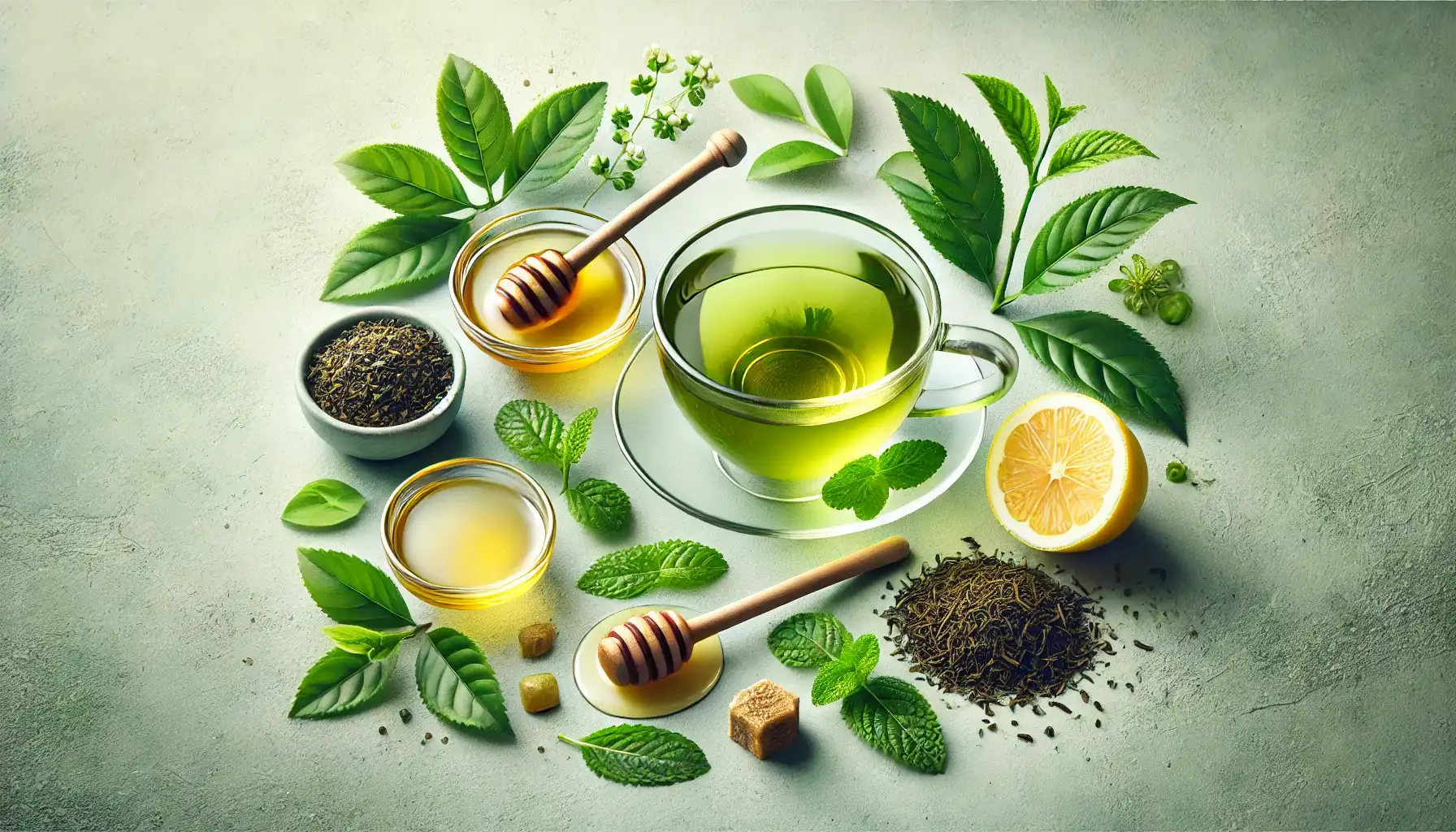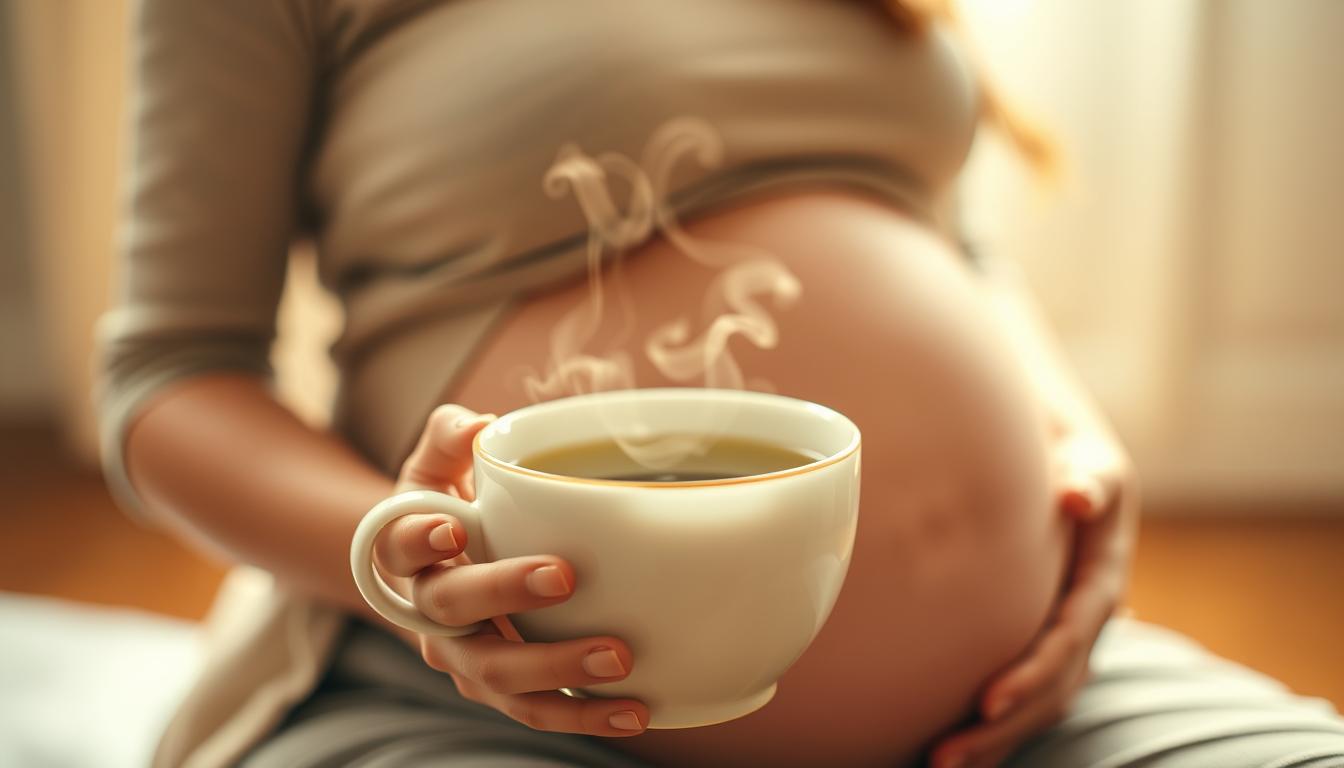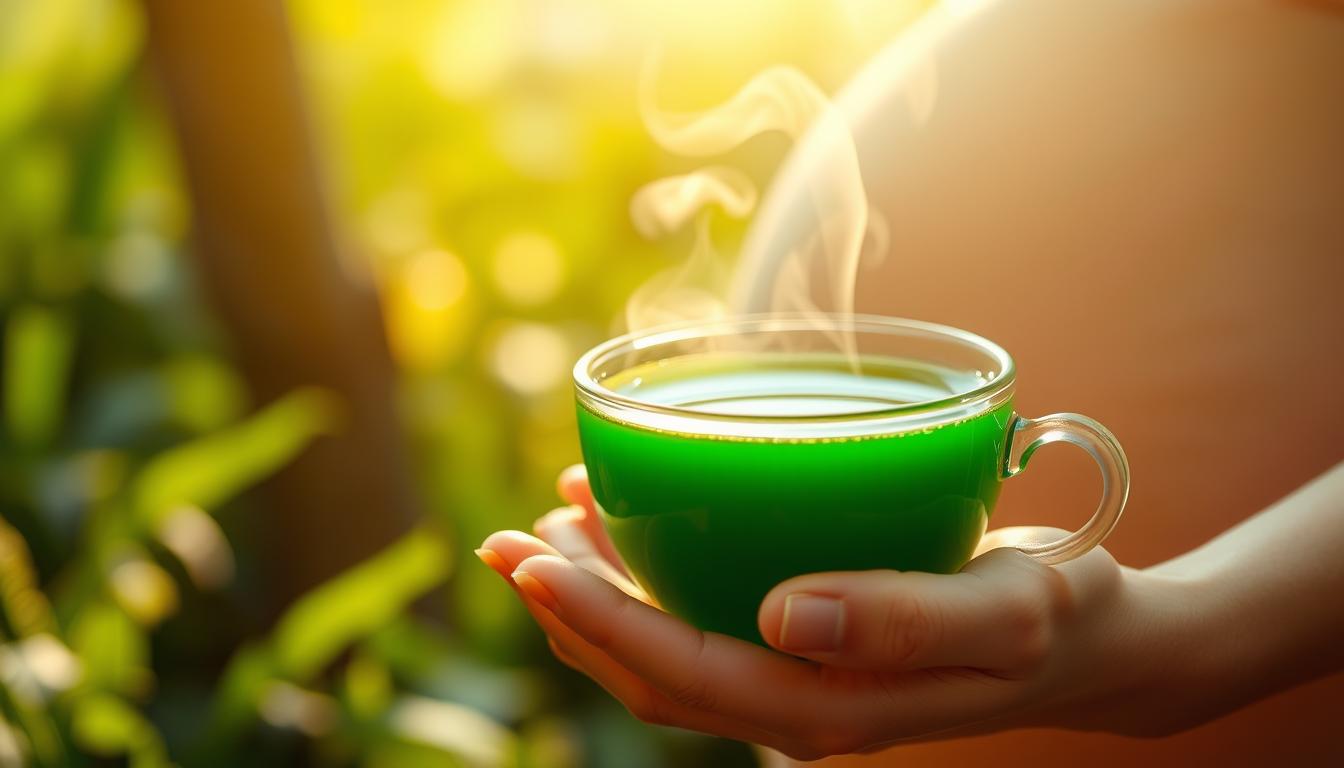Did you know that over 158 million Americans drink tea daily? Among them, many pregnant women turn to green tea for its natural benefits. Made from the same plant as black tea, this beverage is packed with antioxidants and offers a moderate caffeine content. But when it comes to pregnancy, questions about its safety often arise.
Green tea has gained popularity for its health benefits, especially among expecting mothers. Derived from the Camellia sinensis plant, it contains less caffeine than coffee but still requires caution. Doctors often provide varying advice on caffeine intake, making it essential to consult a healthcare provider during this critical time.
This article explores the benefits and risks of green tea for pregnant women. We’ll compare it with other types of tea, discuss how caffeine may affect the baby, and emphasize the importance of overall health and nutrition. Let’s dive into the details to help you make informed choices.
Key Takeaways
- Green tea comes from the same plant as black tea and contains antioxidants.
- It has less caffeine than coffee but should still be consumed cautiously.
- Consulting a doctor is crucial for personalized advice during pregnancy.
- Caffeine can cross the placenta, potentially affecting the baby.
- Balanced nutrition and health are vital for expecting mothers.
Understanding Green Tea and Its Health Benefits
Green tea stands out among beverages for its rich nutrient profile. Unlike herbal tea, which comes from various plants, this drink is made from the leaves of the Camellia sinensis plant. Its unique production process involves steaming or pan-frying the leaves, preserving their natural compounds.

What Makes Green Tea Unique?
Green tea contains polyphenols, which are powerful antioxidants. These compounds help protect cells from damage caused by free radicals. Research shows that polyphenols may support heart health, improve brain function, and reduce inflammation.
Unlike herbal tea, green tea is not classified as an herb. It retains its natural caffeine content, though in smaller amounts than coffee. The brewing process also plays a role in its strength. A higher amount of leaves used can increase the concentration of beneficial compounds.
The Role of Antioxidants and Polyphenols
Antioxidants in green tea, such as catechins, are known for their health benefits. They help neutralize harmful molecules in the body, promoting overall wellness. Studies suggest that regular consumption may reduce stress and support nutrient absorption.
“The polyphenols in green tea are among the most studied compounds for their health-promoting properties.”
Here’s a quick comparison of green tea and herbal tea:
| Aspect | Green Tea | Herbal Tea |
|---|---|---|
| Source | Camellia sinensis leaves | Various herbs and plants |
| Caffeine | Moderate | None |
| Primary Benefit | Rich in antioxidants | Varied, depending on the herb |
Green tea may offer numerous benefits, but its effects depend on how it’s prepared and consumed. Whether you enjoy it hot or iced, this beverage can be a valuable addition to a balanced diet.
Is green tea safe during pregnancy? Expert Guidelines and Research
Many expecting mothers wonder about the safety of their favorite beverages. Caffeine, a key component in green tea, often raises questions. While it contains less caffeine than coffee, moderation is essential for a safe pregnancy.

Caffeine Content and Recommended Limits
Green tea typically has 20-45 mg of caffeine per cup, compared to 95 mg in coffee. Experts recommend limiting caffeine intake to less than 200 mg per day for pregnant women. This helps reduce potential risk to the baby.
Here’s a quick breakdown of caffeine levels in common beverages:
- Green tea: 20-45 mg per cup
- Black tea: 40-70 mg per cup
- Coffee: 95 mg per cup
Evidence from Recent Studies
Recent study findings suggest that high caffeine intake may increase the risk of low birth weight or preterm delivery. However, moderate consumption within the recommended level is generally considered tea safe.
One study published in 2023 highlighted that caffeine crosses the placenta, potentially affecting fetal development. Another emphasized individual differences in caffeine metabolism, making personalized advice crucial.
“Moderation and consultation with a healthcare provider are key to ensuring a safe pregnancy.”
To enjoy green tea responsibly, monitor your intake and consider decaffeinated options. Always consult your doctor to interpret study results and make informed decisions.
Caffeinated and Herbal Teas: Weighing the Benefits and Risks
Choosing the right beverage during pregnancy can be a balancing act. Both caffeinated and herbal teas offer unique benefits, but understanding their effects is crucial for safety and health.
Comparing Caffeinated Teas and Their Effects
A standard cup of green tea contains 20-45 mg of caffeine, while black tea has 40-70 mg. Matcha, a powdered form, can have even higher levels. These differences matter, especially during the first trimester, when caffeine sensitivity is heightened.
Research shows that excessive caffeine intake may lead to lower birth weight. However, moderate consumption within recommended limits is generally considered safe. Always monitor your intake to avoid adverse effects.
Herbal Tea Considerations for Pregnant Women
Herbal teas, like raspberry leaf, are often caffeine-free and rich in nutrients. However, not all herbal options are safe for pregnancy. Some herbs can stimulate the uterus or interfere with hormone levels.
When selecting herbal teas, focus on those widely considered safe, such as ginger or peppermint. Always consult your healthcare provider to ensure the best choice for your safety and your baby’s health.
“Moderation is key when enjoying tea during pregnancy. Balancing benefits with potential risks ensures a healthier experience.”
Whether you prefer caffeinated or herbal options, understanding their effects and practicing moderation can help you make informed decisions. A typical cup size also matters when calculating overall caffeine intake.
Additional Tips for a Healthy Pregnancy with Tea
Navigating beverage choices can feel overwhelming for an expecting woman. Tea can be a comforting option, but it’s essential to consume it wisely. Here are practical tips to help you enjoy your favorite drink while prioritizing health.
Strategies for Managing Caffeine Intake
Keeping caffeine levels in check is crucial. Limit your intake to less than 200 mg per day. This includes all sources, such as coffee, soda, and tea. Track your consumption each week to ensure you stay within the recommended range.
Opt for decaffeinated versions of your favorite drinks. Herbal tea may also be a great alternative, offering flavor without the caffeine. Ginger tea, in particular, can help alleviate morning sickness with its soothing properties.
Safe Tea Preparation and Consumption Methods
How you prepare your drink matters. Use filtered water and steep your tea for the recommended time to avoid bitterness. Read labels carefully to understand caffeine content and brewing instructions.
Consider smaller cup sizes to manage portions. This helps you enjoy your drink without exceeding daily limits. Always prioritize quality over quantity when selecting your tea.
Consulting Healthcare Providers
Every woman’s body is different, especially during pregnancy. Consult your healthcare provider for personalized advice. They can guide you on how much and what type of tea is best for you.
“Your doctor can help you balance enjoyment with safety, ensuring a healthier experience for you and your baby.”
Pay special attention during the first trimester, when caffeine sensitivity is highest. Regular check-ins with your provider can help you make informed decisions throughout each trimester.
Conclusion
Making informed beverage choices can significantly impact maternal and fetal health. Green tea offers antioxidants but requires careful consumption due to its caffeine content. Raspberry leaf and red raspberry varieties are often debated for their role in preparing for labor, though their effects on the placenta remain under study.
Opting for a safe drink, like decaffeinated tea or properly prepared green tea, is recommended. Staying hydrated with water remains essential throughout this period. Some tea leave behind compounds that may require cautious use, especially during labor.
Balanced food and drink choices support a healthy experience. Always consult your healthcare provider to monitor intake and ensure both mother and baby remain healthy. A thoughtful approach to beverages can make a meaningful difference.

